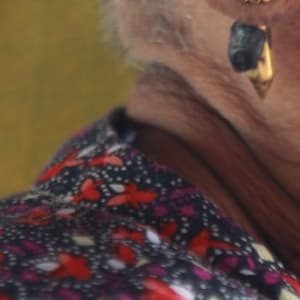dry behind the ears: Idiom Meaning and Origin
What does ‘dry behind the ears’ mean?
The idiom "dry behind the ears" means someone is still young or inexperienced.

Idiom Explorer
The idiom "know beans about" means to have little or no knowledge about a particular subject or topic.
The idiom "in the dark" means being unaware or uninformed about something, lacking knowledge or understanding. It is often used to describe a situation where someone is kept ignorant or intentionally left out of important information or events.
The idiom "in short trousers" is used to describe someone who is young or inexperienced, often implying that they lack maturity or knowledge in a particular area.
"High and dry" is an idiom that means to be left in a difficult or helpless situation, especially without any assistance or support.
The idiom "hang out to dry" means to leave someone in a difficult or vulnerable situation without support or assistance.
The idiom "get wet" means to be exposed to or experience something new or unfamiliar, often in a difficult or challenging way. It implies facing a novel situation that may be uncomfortable or outside one's comfort zone.
The idiom "fresh off the boat" refers to a person who has just arrived in a new country or place and is inexperienced or naive about the local customs and culture.
The idiom "fresh legs" refers to someone or something that is new or rejuvenated, providing a fresh perspective or energy.
Unexpected Origin
The idiom "dry behind the ears" is a commonly used expression in American English. It is used to describe someone who lacks experience or maturity. The phrase suggests that the person is still young or inexperienced in a particular area. While the exact origins of the idiom are unclear, it is believed to have come from the notion that infants have damp skin behind their ears until they are older and able to take care of themselves.
This idiom reflects a cultural understanding that a person who is not "dry behind the ears" is still wet with the remnants of infancy. It implies a sense of immaturity, inexperience, or naivety. It suggests that someone who is still wet behind the ears lacks the necessary qualities or knowledge to fully mature or handle certain situations.
The use of the word "dry" in this idiom conveys the completion of a process or the attaining of a certain level of maturity. It is similar to how wetness behind the ears disappears as children grow older. The idiom implies that individuals gain experience and maturity with time.
While the exact origins and age of this idiom are unknown, it has been used in literature and spoken language for many decades. Native English speakers widely recognize and understand its figurative meaning. This highlights its integration into the language and the importance it holds in communication.
It is important to note that idioms such as "dry behind the ears" are not typically used in formal or academic writing. They find their place in casual conversations, informal settings, and literary works to add color, depth, and cultural context to the language.
While the idiom itself may be clear and widely understood, its usage can vary depending on the context and individuals involved. It is often employed to gently tease or humorously criticize someone who is perceived as lacking experience or maturity. However, it can also be used more neutrally or compassionately to acknowledge someone's newness in a particular domain or situation.
Another related idiom is "in short trousers." This phrase is used to describe someone who is young or immature. It further emphasizes a lack of experience or maturity, similar to being "dry behind the ears." Both idioms paint a picture of someone who still has room to grow and develop.
Similarly, the idiom "bone dry" can be related to being "dry behind the ears." "Bone dry" is used to describe something that is completely dry, without any moisture. It implies a sense of thoroughness and completeness. In the context of being "dry behind the ears," it suggests that once someone attains the level of maturity indicated by being dry, they have fully developed and have no lingering signs of inexperience or immaturity.
Overall, the idiom "dry behind the ears" is a widely recognized expression in American English. It conveys someone's lack of experience or maturity and reflects a cultural understanding of the maturation process. While its exact origins are uncertain, the idiom has become integrated into the language and is typically used in informal settings or literary works. It adds depth and cultural context to the language, allowing for nuanced communication about experience and maturity. As the idiom continues to be used, it conveys both a sense of completion and the potential for growth and development.
Example usage
Examples of how the idiom dry behind the ears can be used in a sentence:
- He is still young and inexperienced, he's not even dry behind the ears yet.
- I don't think you should take her advice, she's not dry behind the ears when it comes to handling these situations.
- He may be the boss now, but he was once a fresh graduate who was far from being dry behind the ears.
The idiom dry behind the ears is used to describe someone who is young, inexperienced, or lacking maturity in a particular area or overall. The phrase suggests that a person is not yet fully developed or seasoned, similar to how a baby's skin is still damp behind the ears after birth. It can be used to communicate someone's lack of knowledge, wisdom, or ability in a certain context.
More "Maturity" idioms



